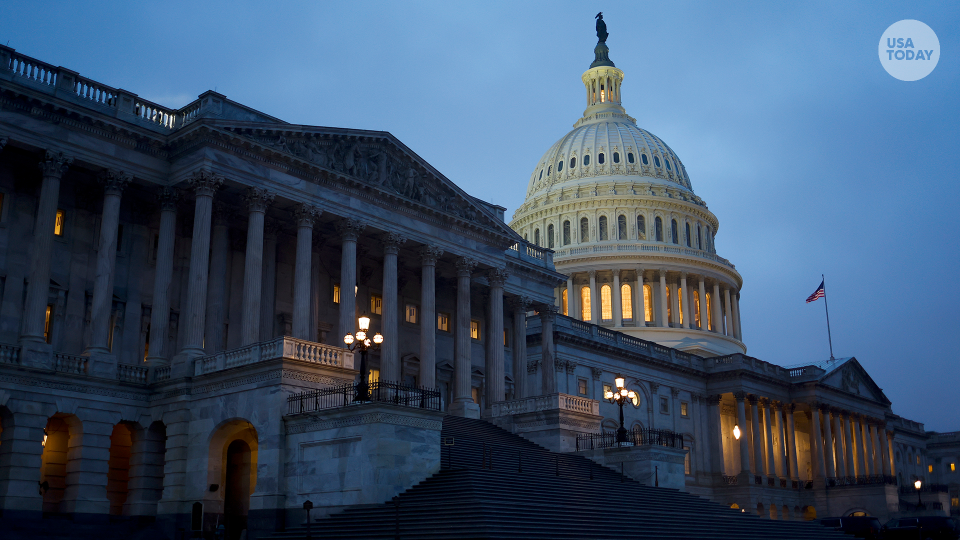If the federal government shuts down, what happens to us in New Jersey?
- Oops!Something went wrong.Please try again later.
All eyes are on Congress this last week of September as lawmakers race to reach a deal that would prevent a federal government shutdown, the first since the 34-day shutdown in late 2018 under then-President Donald Trump.
Experts warn of longer airport lines and shuttered national parks. If congressional Republicans don’t cut a deal by Saturday, the nation could see its 22nd shutdown in the last five decades.
President Joe Biden wrote on X, formerly Twitter, that the last time Congress failed to pass a government spending bill, nearly a million Americans were furloughed or went without pay.
According to NorthJersey.com affiliate USA TODAY, processing times at the Internal Revenue Service slowed down during the last shutdown and military families had less access to family support programs.
But Dan Cassino, a political science professor at Fairleigh Dickinson University, said the effect on New Jersey during the 2018-2019 shutdown was somewhat muted.
“In other states, if we’re having this conversation, in Delaware, Maryland, it’s a huge drain on the economy, because you have all the federal workers out of work,” Cassino said in an interview.
According to the U.S. Office of Personnel Management, nearly 25,000 federal employees are based in New Jersey, representing just 1.32% of the state’s workforce. For comparison, federal workers represent 7.56% of the workforce in Washington, D.C., and 8.15% of California’s workforce.

“We are a state that is really a giver in terms of federal tax money,” Cassino added. “We send lots of money to the federal government. We don’t get that much back.”
The Rutgers Economic Advisory Service estimated in September 2021 that New Jersey receives 75 cents for every tax dollar sent to Washington, D.C., the fourth-lowest return on tax dollars. West Virginia, it was estimated, receives $3.66.
Military bases like the Picatinny Arsenal in Morris County and Joint Base McGuire-Dix-Lakehurst would stay open, Cassino said, since the workers are essential personnel, but they would not get paid.
“We don’t have these huge base towns the way we do down in Texas,” he said.
Cassino said the Gateway project — including the $16.1 billion Hudson River rail tunnels — could face delays if there’s a shutdown.
“In terms of pushing the paperwork, having the meetings, it’s not going to be happening … as long as the budget lapses,” he said.
During the 2018-2019 shutdown, benefits such as Medicare and Social Security were still provided. The United States Postal Service, an independent agency, was not affected by the shutdown.
Amtrak trains, some of which operate out of New Jersey, ran and operated as usual.
What was affected in the government shutdown last time
The shutdown affected New Jersey's national parks, including Paterson Great Falls National Historical Park and Thomas Edison National Historical Park.
The Great Falls remained open, but there were no visitor services available and the Welcome Center remained closed. Thomas Edison National Historical Park was closed.
National parks across the country saw an influx of trash, human waste and damage due to a lack of park rangers patrolling them.
Food safety inspections were delayed, and travelers at Newark Liberty International Airport faced delays because of a shortage of air traffic controllers caused by the shutdown.
Millions of small-business owners didn’t have access to loans and technical assistance through the Small Business Administration.
Those looking to buy a house or refinance their mortgage were in a bind, as any home purchase or mortgage refinancing insured by the Federal Housing Administration was put on hold.
Daniel Munoz covers business, consumer affairs, labor and the economy for NorthJersey.com and The Record.
Email: munozd@northjersey.com; Twitter:@danielmunoz100
This article originally appeared on NorthJersey.com: What does government shutdown affect in NJ?

